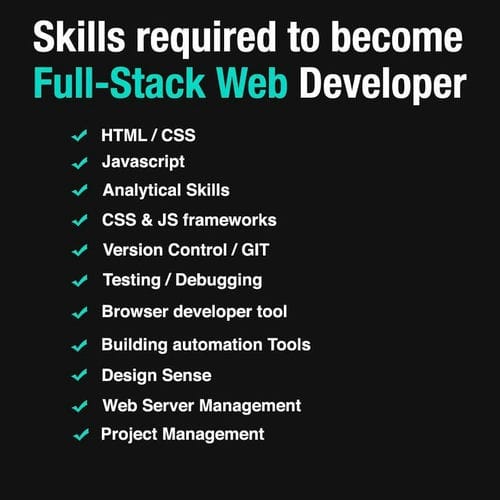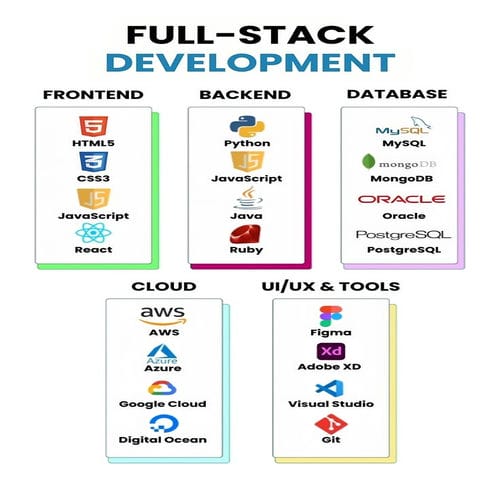Are you fascinated by the dynamic world of software development? Wondering what is a full stack software developer in today’s tech-driven landscape? Look no further. In this comprehensive guide, we delve deep into the realm of Full Stack Development, exploring the multifaceted role of developers proficient in both frontend and backend technologies.
As businesses increasingly rely on digital solutions to thrive in a competitive market, the demand for versatile developers capable of tackling diverse challenges is at an all-time high. We unravel the intricacies of Full Stack Development, uncovering the skills, responsibilities, and future prospects that define this exciting career path.
Whether you’re a seasoned developer looking to expand your skill set or an aspiring technologist seeking to enter the industry, this guide promises to be your roadmap to success in the ever-evolving world of software development.
Embark on this journey with us and unlock the secrets to mastering the art of Full Stack Software Development.
What Is a Full Stack Software Developer?
1. Understanding the Versatility
Full Stack Developers possess skills in both frontend and backend development, making them versatile professionals capable of handling various aspects of software development.
2. Frontend Mastery
In frontend development, Full Stack Developers create user interfaces using HTML, CSS, and JavaScript, focusing on usability and visual appeal.
3. Backend Brilliance
On the backend, Full Stack Developers manage server-side logic and databases, utilising programming languages like Python, Java, or Node.js to build robust systems and ensure efficient data management.
The ability to work across frontend and backend technologies gives Full Stack Developers an edge in tackling diverse projects, collaborating with teams, and innovating solutions to meet business and user needs.
4. Unlock Your Full Potential
Whether you’re an experienced developer seeking to broaden your skill set or a newcomer entering the tech industry, mastering the role of a Full Stack Developer offers numerous opportunities for growth and a fulfilling career path. We explore the world of Full Stack Development and uncover the keys to success in this dynamic field.

Responsibilities of a Full Stack Software Developer
1. Comprehensive Project Management
Full Stack Developers play a pivotal role in the entire software development life cycle, from conceptualisation to deployment. They collaborate closely with stakeholders, understand project requirements, and translate them into functional solutions.
2. Frontend Development
In the realm of frontend development, Full Stack Developers focus on creating vigilant user interfaces that enhance user experience. They use technologies like HTML, CSS, and JavaScript to design responsive layouts, ensuring seamless interaction across devices.
3. Backend Development
On the backend, Full Stack Developers handle server-side logic and database management. They architect scalable systems, write efficient code, and optimize performance to ensure smooth operation and data integrity.
4. Integration and Testing
Full Stack Developers are responsible for integrating frontend and backend components, ensuring seamless communication and functionality. They conduct thorough testing to identify and rectify issues, ensuring the quality and reliability of the software.
5. Continuous Learning and Adaptation
In the fast-paced world of technology, Full Stack Developers are lifelong learners. They stay updated on emerging trends, tools, and best practices, adapting their skills to meet evolving industry demands.
6. Driving Innovation
Full Stack Developers are not just implementers but also innovators. They propose creative solutions, explore new technologies, and contribute to the continuous improvement of products and processes.
As a Full Stack Developer, you’ll embark on a journey of constant learning, problem-solving, and innovation. Whether you’re passionate about frontend design, backend architecture, or the integration of both, this role offers a platform to unlock your full potential and make a meaningful impact in the world of software development.
Essential Skills for Full Stack Development
1. Proficiency in Frontend Technologies
Full Stack Developers must have a solid grasp of frontend technologies to create engaging user interfaces. This includes proficiency in HTML for structuring web pages, CSS for styling, and JavaScript for adding interactivity and dynamic behaviour to websites and applications.
2. Understanding of Backend Development
In addition to frontend skills, Full Stack Developers need to be proficient in backend development. This involves understanding server-side programming languages like Python, Java, or Node.js, as well as database management systems like SQL and NoSQL. They must be able to design and implement server-side logic, manage data effectively, and ensure the security and scalability of backend systems.
3. Knowledge of Version Control
Version control systems like Git are essential tools for Full Stack Developers to manage code changes, collaborate with team members, and track project history. Proficiency in version control allows developers to work efficiently, experiment with new features, and roll back changes when necessary.
4. Experience with Frameworks and Libraries
Full Stack Developers often utilize frameworks and libraries to streamline development processes and enhance productivity. This includes frontend frameworks like React, Angular, and Vue.js for building interactive user interfaces, as well as backend frameworks like Django, Flask, and Express.js for rapid application development.
5. Problem-Solving and Critical Thinking
Effective problem-solving skills are essential for Full Stack Developers to overcome technical challenges and optimize solutions. They must be able to analyze problems, identify root causes, and devise effective strategies to address them. Critical thinking skills are also crucial for evaluating alternative solutions and making informed decisions throughout the development process.
6. Continuous Learning and Adaptation
The field of software development is constantly evolving, with new technologies and best practices emerging regularly. Full Stack Developers must be committed to continuous learning and adaptation to stay updated on the latest trends and advancements in the industry. By staying proactive and embracing lifelong learning, developers can ensure their skills remain relevant and in-demand in today’s competitive job market.

Tools and Technologies Used by Full Stack Developers
1. Frontend Frameworks
Full Stack Developers utilize frontend frameworks to streamline the development of dynamic and responsive user interfaces. Frameworks like React, Angular, and Vue.js provide pre-built components, state management, and routing capabilities, enabling developers to build scalable and maintainable frontend applications efficiently.
2. Backend Frameworks and Technologies
In the backend realm, Full Stack Developers utilize frameworks and technologies to build robust server-side applications and APIs. Frameworks like Django (Python), Flask (Python), Spring Boot (Java), and Express.js (Node.js) offer features such as routing, middleware support, and database integration, empowering developers to create scalable and performant backend systems.
3. Database Management Systems
Effective data management is essential for Full Stack Developers, and they often work with various Database Management Systems (DBMS) to store and retrieve data. SQL databases like MySQL, PostgreSQL, and SQLite are commonly used for relational data storage, while NoSQL databases like MongoDB and Redis are preferred for non-relational data and caching.
4. Version Control Systems
Version control systems are indispensable tools for Full Stack Developers to track changes, collaborate with team members, and maintain code quality. Git, with platforms like GitHub and GitLab, allows developers to manage code repositories, create branches for feature development, and merge changes seamlessly, ensuring a smooth and efficient development workflow.
5. Development Environments and Tools
Full Stack Developers rely on development environments and tools to streamline their workflow and enhance productivity. Integrated Development Environments (IDEs) like Visual Studio Code, PyCharm, and IntelliJ IDEA provide features such as code editing, debugging, and version control integration, while package managers like npm (Node.js) and pip (Python) simplify dependency management and project setup.
In today’s rapidly evolving tech landscape, staying updated on the latest tools and technologies is crucial for Full Stack Developers to remain competitive and deliver innovative solutions. By mastering the tools and technologies, developers can streamline their workflow, build scalable and robust applications, and stay ahead of the curve in the dynamic world of Full Stack Development.

Advantages of Being a Full Stack Developer
1. Efficient Collaboration
Full Stack Developers possess a comprehensive understanding of software development, allowing them to collaborate effectively with cross-functional teams. They can communicate technical concepts to non-technical stakeholders, bridge the gap between design and development, and streamline collaboration between frontend and backend developers.
2. End-to-End Ownership
Full Stack Developers have the opportunity to take ownership of projects from start to finish. They can design user interfaces, architect backend systems, implement features, and deploy applications independently, empowering them to see their ideas come to life and make a tangible impact on the final product.
3. Continuous Learning and Growth
The dynamic nature of Full Stack Development offers ample opportunities for continuous learning and growth. Whether it’s mastering new technologies, exploring different frameworks, or refining problem-solving skills, developers can embark on a journey of lifelong learning and stay at the forefront of technological innovation.
As a Full Stack Developer, you’ll enjoy the benefits of versatility, efficient collaboration, end-to-end ownership, and continuous learning.
Challenges and Considerations
1. Managing Complexity
One of the key challenges for Full Stack Developers is managing the complexity of projects that involve both frontend and backend development. Balancing the intricacies of frontend user interfaces with the logic and data management on the backend requires careful planning and execution.
2. Staying Updated
The fast-paced nature of technology means that Full Stack Developers must continuously update their skills and stay up-to-date of new tools, frameworks, and best practices. Keeping up with the latest advancements can be challenging but is essential to remain relevant in the ever-evolving tech industry.
3. Specialization vs. Generalization
Full Stack Developers often face the dilemma of whether to specialize in a specific area of development or maintain a broader skill set. While specialization can lead to deeper expertise in a particular domain, maintaining a generalist approach allows developers to work on a wide range of projects and adapt to changing requirements.
4. Overcoming Challenges
Despite the challenges, Full Stack Developers can overcome obstacles by improving their problem-solving skills, staying organised, and utilizing resources like online courses, communities, and mentorship. By embracing challenges as opportunities for growth, developers can navigate the complexities of Full Stack Development and thrive in their careers.
Future Demand of Software Developers
1. Industry Growth and Digital Transformation
The demand for software engineers will increase significantly in the coming years, driven by the rapid expansion of businesses relying on digital solutions.
From e-commerce and healthcare to finance and entertainment, businesses across sectors are undergoing digital transformation, driving the need for skilled developers to innovate and implement technological solutions.
2. Emerging Technologies Driving Demand
Technological advancements in areas like artificial intelligence, machine learning, cloud computing, and the Internet of Things (IoT) are reshaping industries and creating new opportunities for software developers.
As businesses utilize these technologies to gain a competitive edge and meet evolving customer demands, the demand for developers proficient in these areas is expected to skyrocket.
3. Global Job Market Trends
The demand for software developers is not limited to specific regions but extends globally. With the rise of remote work and the increasing interconnectedness of the global economy, developers have access to opportunities across borders, allowing them to work with international teams and contribute to projects worldwide.
4. Continuous Learning for Future Readiness
To thrive in the future job market, software developers must embrace continuous learning and upskilling. By staying updated on emerging technologies, mastering new tools and frameworks, and adapting to changing industry trends, developers can position themselves for success and remain in high demand in the dynamic world of software development.
As the demand for software engineers continues to expand, there has never been a better time to pursue a career in this field.
Career Paths and Opportunities
1. Diverse Career Trajectories
Full Stack Developers have a multitude of career paths to explore, ranging from web development and software engineering to technical leadership and entrepreneurship. The versatility of their skill set allows them to pursue opportunities in various industries and domains, including e-commerce, healthcare, finance, and entertainment.
2. Specialization and Advancement
While Full Stack Development offers a broad skill set, developers also have the option to specialize in specific areas of interest, such as frontend design, backend architecture, or DevOps. Specialization can lead to advanced roles like technical lead, architect, or specialist developer, offering opportunities for career advancement and higher salaries.
3. Entrepreneurship and Innovation
Full Stack Developers with an entrepreneurial mindset can leverage their skills to launch startups, build innovative products, and disrupt industries. The ability to oversee the entire development process gives them a unique advantage in bringing ideas to market quickly and efficiently.
4. Remote Work and Freelancing
The rise of remote work and the gig economy has opened up new avenues for Full Stack Developers to work flexibly and independently. With the ability to collaborate with teams and clients from anywhere in the world, developers can enjoy the freedom to choose their projects and create their schedules.
5. Continuous Growth and Learning
Regardless of the career path chosen, Full Stack Developers must prioritize continuous growth and learning to stay relevant in a rapidly evolving industry. By attending conferences, participating in online courses, and joining communities, developers can expand their skill set, network with peers, and stay at the forefront of technological innovation.
6. Seize Your Opportunities
As you embark on your journey as a Full Stack Developer, the possibilities are endless. Whether you’re passionate about building innovative products, leading teams, or launching your own venture, the skills and expertise you acquire will open doors to exciting career opportunities and endless possibilities for growth and success.
Conclusion
In conclusion, mastering the role of a Full Stack Developer opens doors to a world of opportunities in the ever-evolving tech industry. By equipping yourself with the essential skills, embracing continuous learning, and staying ahead of industry trends, you can position yourself for success in this dynamic field.
Whether you’re a seasoned developer looking to expand your skill set or an aspiring technologist eager to enter the industry, Devtrain.co offers comprehensive resources and courses to help you excel in Full Stack Development.
Take the next step in your journey today and unlock your potential as a Full Stack Developer with Devtrain.co.


